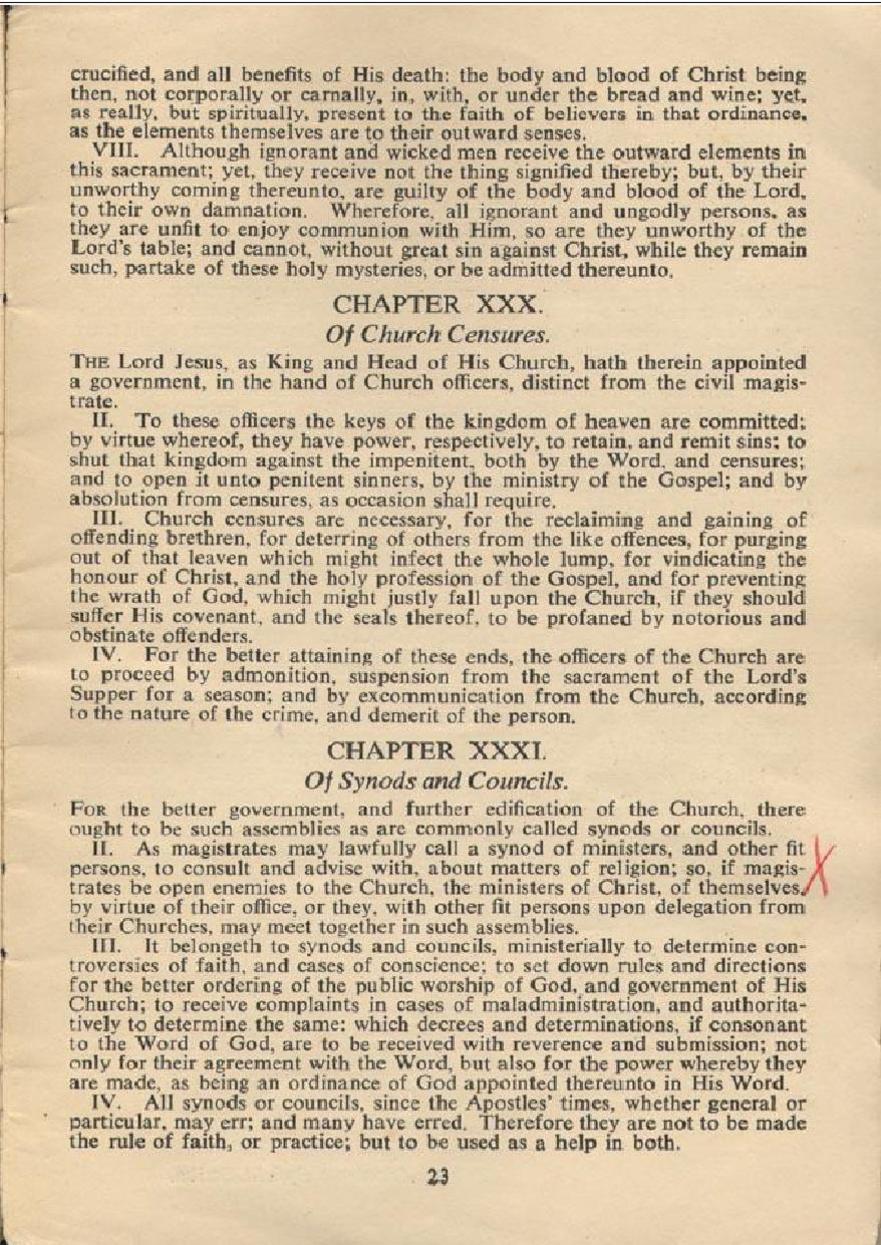crucified, and all benefits of His death: the body and blood of Christ being then, not corporally or carnally, in, with, or under the bread and wine; yet, as really, but spiritually, present to the faith of believers in that ordinance, as the elements themselves are to their outward senses.
VIII. Although ignorant and wicked men receive the outward elements in this sacrament; yet, they receive not the thing signified thereby; but, by their unworthy coming thereunto, are guilty of the body and blood of the Lord, to their own damnation. Wherefore, all ignorant and ungodly persons, as they are unfit to enjoy communion with Him, so are they unworthy of the Lord’s table; and cannot, without great sin against Christ, while they remain such, partake of these holy mysteries, or be admitted thereunto.
CHAPTER XXX.
Of Church Censures.
The Lord Jesus, as King and Head of His Church, hath therein appointed a government, in the hand of Church officers, distinct from the civil magistrate.
II. To these officers the keys of the kingdom of heaven are committed; by virtue whereof, they have power, respectively, to retain, and remit sins; to shut that kingdom against the impenitent, both by the Word, and censures; and to open it unto penitent sinners, by the ministry of the Gospel; and by absolution from censures, as occasion shall require.
III. Church censures are necessary, for the reclaiming and gaining of offending brethren, for deterring of others from the like offences, for purging out of that leaven which might infect the whole lump, for vindicating the honour of Christ, and the holy profession of the Gospel, and for preventing the wrath of God, which might justly fall upon the Church, if they should suffer His covenant, and the seals thereof, to be profaned by notorious and obstinate offenders.
IV. For the better attaining of these ends, the officers of the Church are to proceed by admonition, suspension from the sacrament of the Lord’s Supper for a season; and by excommunication from the Church, according to the nature of the crime, and demerit of the person.
CHAPTER XXXI.
Of Synods and Councils.
For the better government, and further edification of the Church, there ought to be such assemblies as are commonly called synods or councils.
II. As magistrates may lawfully call a synod of ministers, and other fit persons, to consult and advise with, about matters of religion; so, if magistrates be open enemies to the Church, the ministers of Christ, of themselves by virtue of their office, or they, with other fit persons upon delegation from their Churches, may meet together in such assemblies.
III. It belongeth to synods and councils, ministerially to determine controversies of faith, and cases of conscience; to set, down rules and directions for the better ordering of the public worship of God, and government of His Church; to receive complaints in cases of maladministration, and authoritatively to determine the same: which decrees and determinations, if consonant to the Word of God, are to be received with reverence and submission; not only for their agreement with the Word, but also for the power whereby they are made, as being an ordinance of God appointed thereunto in His Word.
IV. All synods or councils, since the Apostles’ times, whether general or particular, may err; and many have erred. Therefore they are not to be made the rule of faith and practice; but are to be used as an help in both.
23
